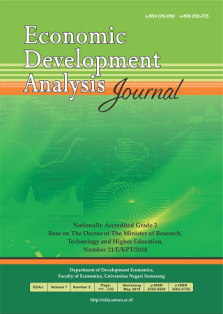The Impact of Seaport Activities on Growth: Evidence from Indonesia
Abstract
The research aims to analyse the impact of seaport activity on economic development in Indonesia. The time series of data has ranged between 2008 – 2018. This cross-section of data covers 33 provinces in Indonesia. The research uses secondary sources, such as the Central Statistics Agency, CEIC, and Ministries, and employs panel data analysis, which chooses the fixed effect as the best model. The results show that : (i) capital expenditure to gross investment in the economy (PMTB) positively affects boosting economic growth, (ii) the university workforce has a positive impact on per capita income growth (iii) the depreciation appears to erode gross regional domestic product per capita, and (iv) the variables associated with port activity in the model have no significance at a p-value of 1 % or 10 %. Furthermore, the variable with a lag of one year significantly affected growth. It meant that the investment activities impacted the economy in the following year. The policy implications include: (i) Increased government capital expenditure is needed, (ii) Providing the broadest possible access to higher education is one of the policies that can be taken to improve the quality of workers; (iii) improve access to and from the seaport to facilitate the flow of goods both for unloading and loading and unloading at the seaport.


